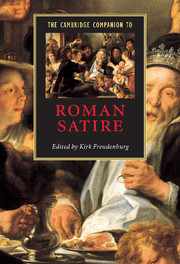Book contents
- Frontmatter
- Introduction
- Part I Satire as literature
- 1 Rome’s first “satirists”
- 2 The restless companion
- 3 Speaking from silence
- 4 The poor man’s feast
- 5 Citation and authority in Seneca’s Apocolocyntosis
- 6 Late arrivals
- 7 Epic allusion in Roman satire
- 8 Sleeping with the enemy
- 9 The satiric maze
- Part II Satire as social discourse
- Part III Beyond Rome
- Conclusion
- Key dates for the study of Roman satire
- Bibliography
- Index
- Series list
4 - The poor man’s feast
Juvenal
from Part I - Satire as literature
Published online by Cambridge University Press: 28 May 2006
- Frontmatter
- Introduction
- Part I Satire as literature
- 1 Rome’s first “satirists”
- 2 The restless companion
- 3 Speaking from silence
- 4 The poor man’s feast
- 5 Citation and authority in Seneca’s Apocolocyntosis
- 6 Late arrivals
- 7 Epic allusion in Roman satire
- 8 Sleeping with the enemy
- 9 The satiric maze
- Part II Satire as social discourse
- Part III Beyond Rome
- Conclusion
- Key dates for the study of Roman satire
- Bibliography
- Index
- Series list
Summary
Juvenal is the satirist of comparatives and superlatives. In exploiting hexameter satire’s partnership with epic, he sets out to look bigger, denser, ruder, slyer, angrier, fleshier, more sophisticated and bilious, to the power of ten, than all the other satirists before him put together. Next to this heavyweight, Horace’s bitter-sweet social commentary, or Persius' harsh medicinal concentrate, should begin to taste like very thin soup. Juvenal rejects outright Callimachean principles of slenderness, compression, and refinement, claiming instead to be driving his chariot “down the track which great Lucilius blazed” (1.19-20). Horace’s irony lite, or Persius' short sharp shock therapy, is to be replaced by behemoth-scale onslaughts inspired by the bellicose Republican freedom fighter. Whereas Horace buries Lucilian rage beneath manicured lawns, Juvenal digs up a century of pent up angst, yet only to hurl it at corpses who cannot answer back. This is war, and there is no escape, either for his victims or readers (and we may well suspect that they are one and the same in his book). The dysfunctional morass of contemporary Rome incites antirationalistic gibe, not spiritual inner journeys or jocular reflection among friends. “Today every vice has reached its zenith,” he announces in his opening poem (149); “doesn’t it make you want to cram wax tablets with invective right there on the street corner?” (63–4).
- Type
- Chapter
- Information
- The Cambridge Companion to Roman Satire , pp. 81 - 94Publisher: Cambridge University PressPrint publication year: 2005
- 4
- Cited by



